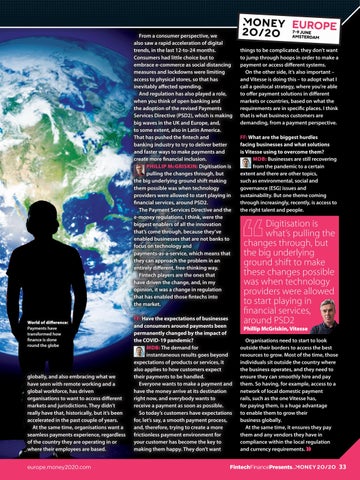From a consumer perspective, we also saw a rapid acceleration of digital trends, in the last 12-to-24 months. Consumers had little choice but to embrace e-commerce as social distancing measures and lockdowns were limiting access to physical stores, so that has inevitably affected spending. And regulation has also played a role, when you think of open banking and the adoption of the revised Payments Services Directive (PSD2), which is making big waves in the UK and Europe, and, to some extent, also in Latin America. That has pushed the fintech and banking industry to try to deliver better and faster ways to make payments and create more financial inclusion. PHILLIP McGRISKIN: Digitisation is pulling the changes through, but the big underlying ground shift making them possible was when technology providers were allowed to start playing in financial services, around PSD2. The Payment Services Directive and the e-money regulations, I think, were the biggest enablers of all the innovation that’s come through, because they’ve enabled businesses that are not banks to focus on technology and payments-as-a-service, which means that they can approach the problem in an entirely different, free-thinking way. Fintech players are the ones that have driven the change, and, in my opinion, it was a change in regulation that has enabled those fintechs into the market. World of difference: Payments have transformed how finance is done round the globe
globally, and also embracing what we have seen with remote working and a global workforce, has driven organisations to want to access different markets and jurisdictions. They didn’t really have that, historically, but it’s been accelerated in the past couple of years. At the same time, organisations want a seamless payments experience, regardless of the country they are operating in or where their employees are based. europe.money2020.com
FF: Have the expectations of businesses and consumers around payments been permanently changed by the impact of the COVID-19 pandemic? MDB: The demand for instantaneous results goes beyond expectations of products or services, it also applies to how customers expect their payments to be handled. Everyone wants to make a payment and have the money arrive at its destination right now, and everybody wants to receive a payment as soon as possible. So today’s customers have expectations for, let’s say, a smooth payment process, and, therefore, trying to create a more frictionless payment environment for your customer has become the key to making them happy. They don’t want
things to be complicated, they don’t want to jump through hoops in order to make a payment or access different systems. On the other side, it’s also important – and Vitesse is doing this – to adopt what I call a geolocal strategy, where you’re able to offer payment solutions in different markets or countries, based on what the requirements are in specific places. I think that is what business customers are demanding, from a payment perspective. FF: What are the biggest hurdles facing businesses and what solutions is Vitesse using to overcome them? MDB: Businesses are still recovering from the pandemic to a certain extent and there are other topics, such as environmental, social and governance (ESG) issues and sustainability. But one theme coming through increasingly, recently, is access to the right talent and people.
Digitisation is what’s pulling the changes through, but the big underlying ground shift to make these changes possible was when technology providers were allowed to start playing in financial services, around PSD2 Phillip McGriskin, Vitesse
Organisations need to start to look outside their borders to access the best resources to grow. Most of the time, those individuals sit outside the country where the business operates, and they need to ensure they can smoothly hire and pay them. So having, for example, access to a network of local domestic payment rails, such as the one Vitesse has, for paying them, is a huge advantage to enable them to grow their business globally. At the same time, it ensures they pay them and any vendors they have in compliance within the local regulation and currency requirements.
FintechFinancePresents–
33
